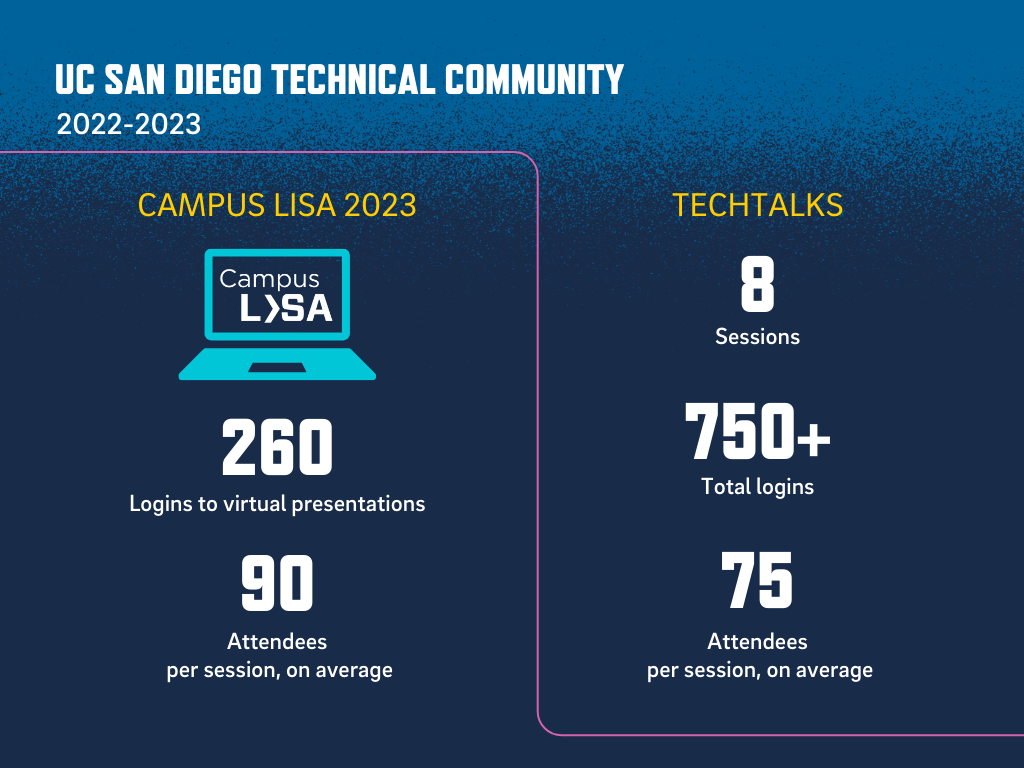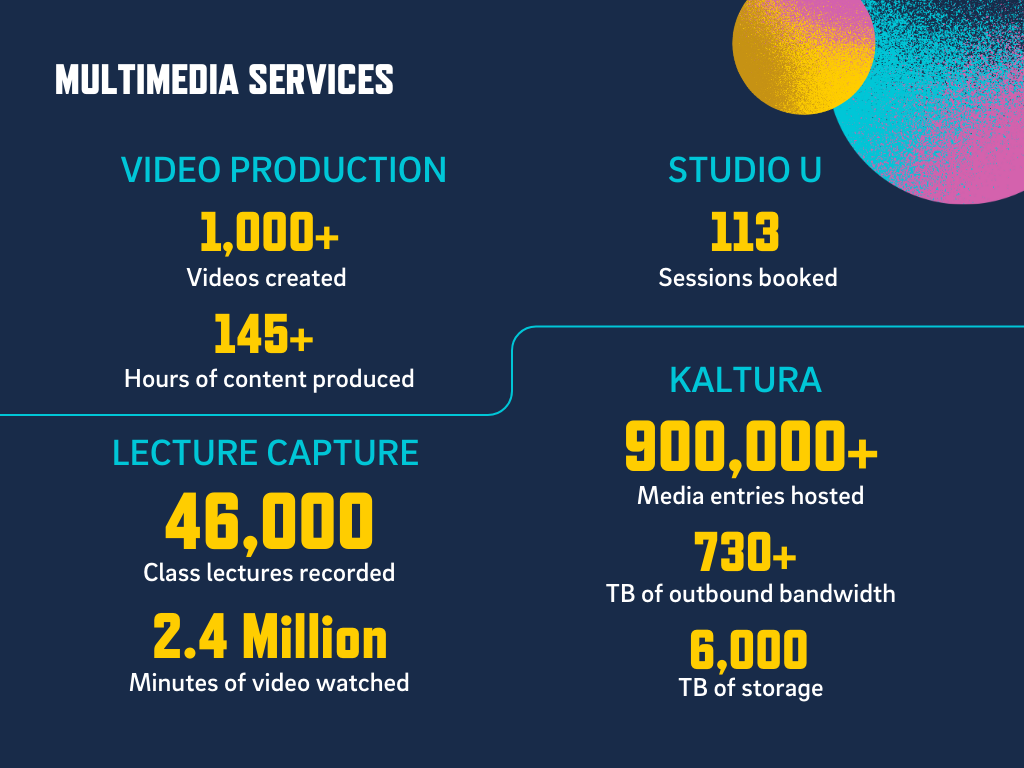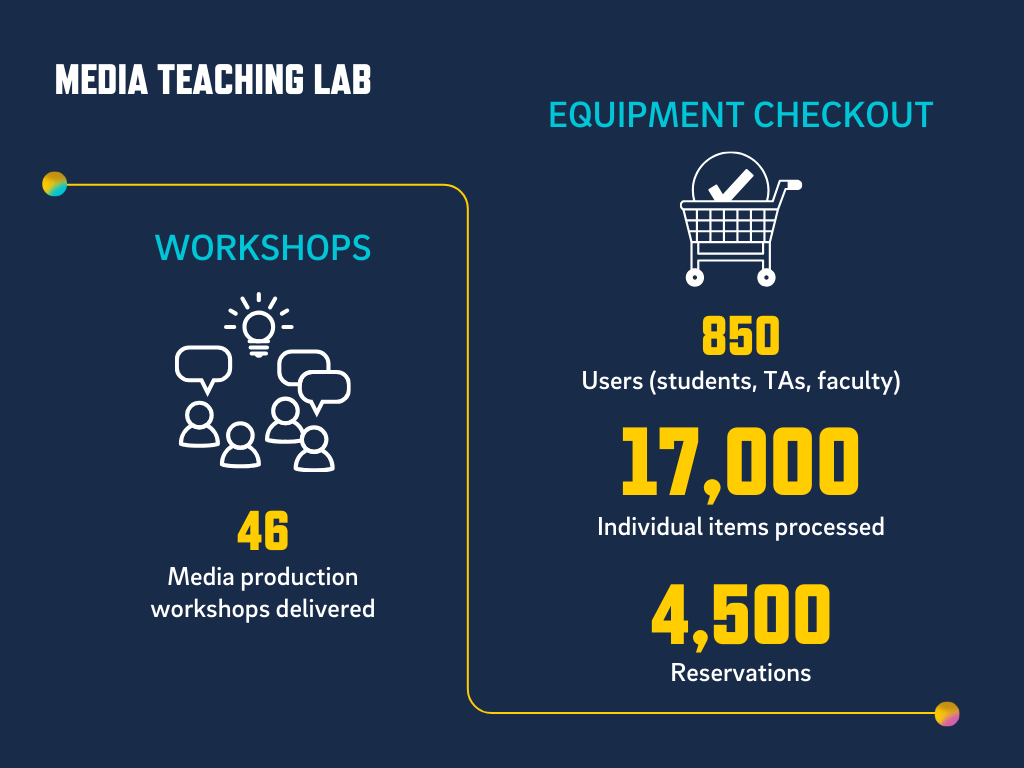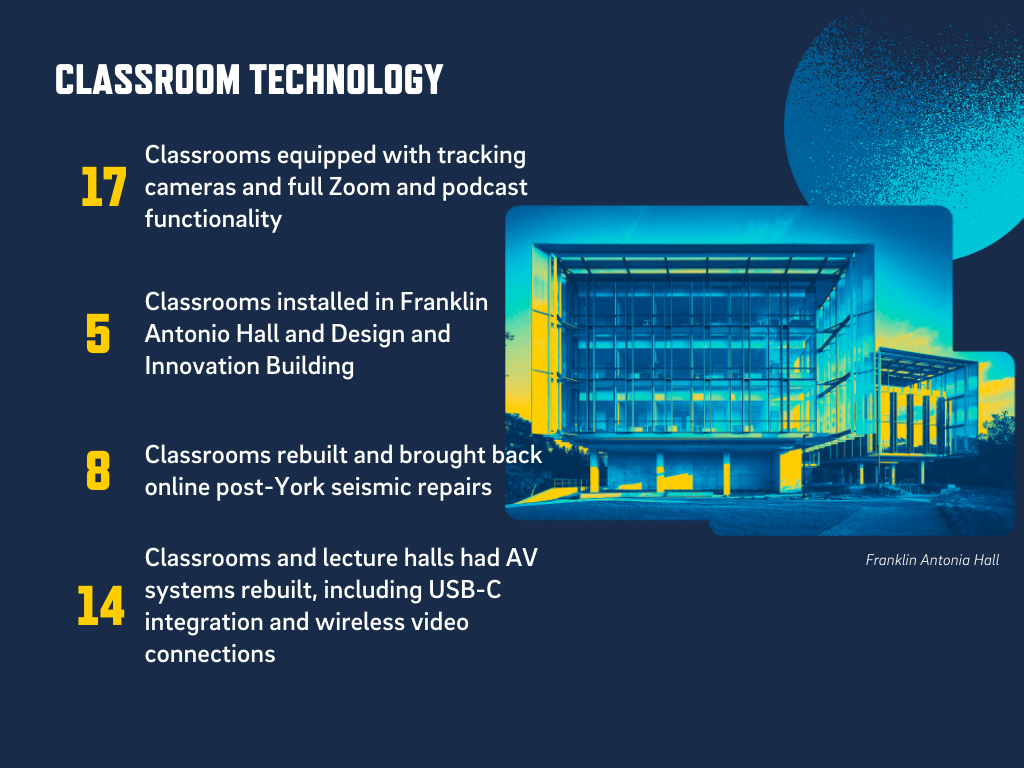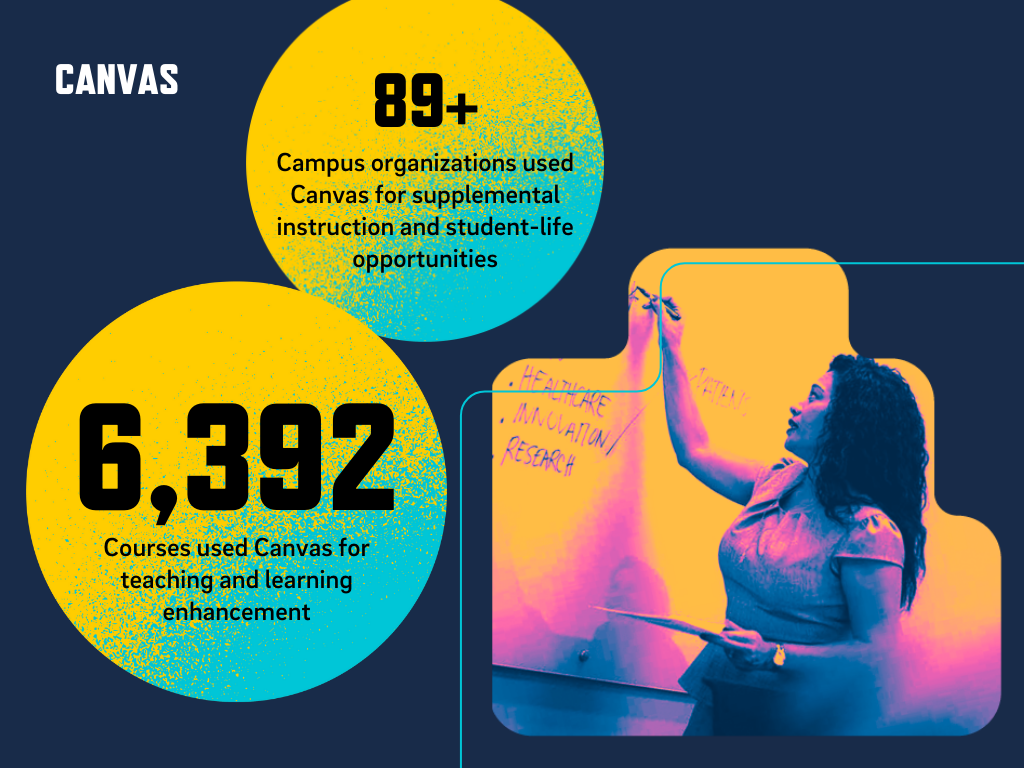Annual Report 2022-2023
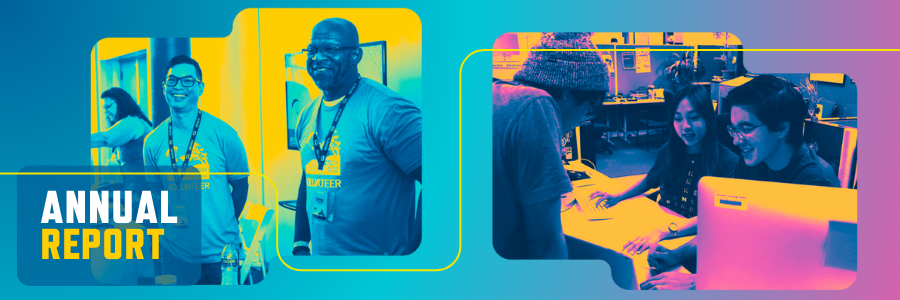
UC San Diego IT Services Annual Report 2022-2023
IT Services provides technology solutions that support UC San Diego’s learning, teaching, and research objectives. In this annual report, you can read more about our recent accomplishments as they relate to the following six departmental strategic goals:
- Goal 1: Support student success and instruction
- Goal 2: Renew legacy enterprise systems
- Goal 3: Continually enhance research services
- Goal 4: Focus on cybersecurity
- Goal 5: Improve service levels and cost efficiency
- Goal 6: Invest in inclusive excellence
A few additional sections highlight the work of the extraordinary people who make up IT Services, as well as the entirety of the UC San Diego technical community.
Unless otherwise noted, all stats reflect the fiscal year July 1, 2022 - June 30, 2023.
Elsewhere on this site, you can:
- Read more about our CIO and department mission, vision, and values
- Learn about our department structure and governance
- Check progress on past annual goals and ongoing key metrics
- Catch up on the latest news
Goal 1: Support Student Success and Instruction
Embracing the Future of Learning
At IT Services, everything we do is dedicated to ensuring students have the opportunity to become changemakers, equipped with the multidisciplinary tools needed to accelerate answers to our world’s most pressing issues. As a result of both Covid-necessitated innovations and accelerating the roadmap of planned enhancements, IT Services’ educational technology teams continue to pursue, embrace and implement cutting-edge technologies in support of student success and instruction.
Check out these impressive stats:
Multimedia Services
- Video Production - 1,000+ videos created and 145+ hours of content produced
- Lecture Capture (Podcasting) - 46,000 class lectures recorded and 2.4+ million minutes of video watched
- Kaltura Video Hosting - 900,000+ media entries hosted, 730+ TB of outbound bandwidth and accumulative storage of 6 PB (petabytes)
- Studio U - 113 faculty/staff recording sessions booked in self-service recording space
Media Teaching Lab
- Equipment Checkout - 850+ users (students, TAs, faculty) and nearly 4,500 reservations containing 17,000+ individual Media Teaching Lab items processed
- Workshops - 46 workshops delivered to students on various media production topics
Classroom Technology
- 17 classrooms equipped with tracking cameras and full Zoom and podcast functionality
- Three new classrooms were installed in Franklin Antonio Hall and two new classrooms were installed in the Design and Innovation Building
- Eight classrooms were rebuilt and brought back online as the York seismic repairs were completed
- 11 classrooms and three lecture halls had their AV systems rebuilt to conform to current standards and technology as part of the Classroom Refresh Program. Key upgrades include:
- USB-C system integration in replacement of VGA
- Wireless video connections for instructors to connect to the system
- Instructor stations added to the classrooms, allowing for centralized control of AV systems and decluttering of classroom space
- Seven new classrooms in the Podemos Building of the Theater District Living Learning Neighborhood (TDLLN) readied for fall 2023 classes
Canvas
- 6,392 courses used Canvas and educational technology support to enhance teaching and learning
- 89+ campus organizations use Canvas to provide supplemental instruction and student-life opportunities
AI Pilots
In June and July of 2023, EdTech Services collaborated with Assistant Teaching Professor Justin Eldridge to run several AI pilots exploring the capabilities of machine learning tools in improving student success and instruction.
Two notable pilots included:
- Leveraging Whisper AI (an open source automated speech recognition model) running locally on our machine learning platform to improve transcription accuracy by 7-8% in lecture capture videos vs. Kaltura’s transcription service
- Running lecture content through LLAMA2 (Large Language Model Meta AI) to create instantaneous study guides and new ways to interact with course content for students
Discover UC San Diego
Discover UC San Diego gives high school students the opportunity to take online college courses free-of-charge, giving all students equitable access to experience college-level classes, regardless of what opportunities are provided through their high school or other local programs.
Through direct access to college courses, students will be able to jumpstart their progress toward earning a college degree by completing up to three courses, the credits for which will be transferable to any university accepting UC San Diego course credits.
The first cohort was launched in the summer of 2023:
- Partnership between - UC San Diego IT Services, UC San Diego Extended Studies, Teaching + Learning Commons and the San Diego Unified School District
- Enrollment - 113 students
- Technologies utilized:
- Canvas (course platform)
- Kaltura (instructional video assets)
- Zoom, Turnitin and Gradescope (3rd party tools to deliver course content)
- Clever (authentication mechanism for HS students and instructional staff)
- Powerschool, Infinite Campus, Clever, UCSD SIS and Canvas (mechanisms to support HS student enrollment and return of final grades to school/district)
- Courses offered:
- The Atmosphere [Marine Science]
- Land and Labor [Ethnic Studies]
- Intro to Computer Science and Object-Oriented Programming: Python [Computer Science]
- Outcomes & Observations from first cohort:
- Majority of inaugural students earned A and B grades
- Program featured a high teaching assistant-to-student ratio for personalized support
Keeping Up with Campus Growth
UC San Diego continues to grow, with enrollment once again topping 42,000 students in Fall 2023 and widespread expansion of the physical footprint of the La Jolla campus and other properties. Keeping up with this growth has been a key priority, with the requisite infrastructure:
- Adding 800+ Wi-Fi access points in the past year. Wi-Fi access points now total 11,076, an increase of 84% since 2016 and 162% since 2013. An additional 5,648 access points are planned through 2028 to support new growth.
- Installing 24 external access points and directional antennas to cover outdoor areas around Library Walk and Town Center
- Equipping the new Eighth College Theater District Living and Learning Neighborhood with hundreds of access points
- Installing 240 access points to Rita Atkinson Residences during its conversion to undergrad housing and 39 access points at Pepper Canyon Amphitheater
- Replacing older access points with higher performing ones and conducting software upgrades to provide the latest features, performance, and stability
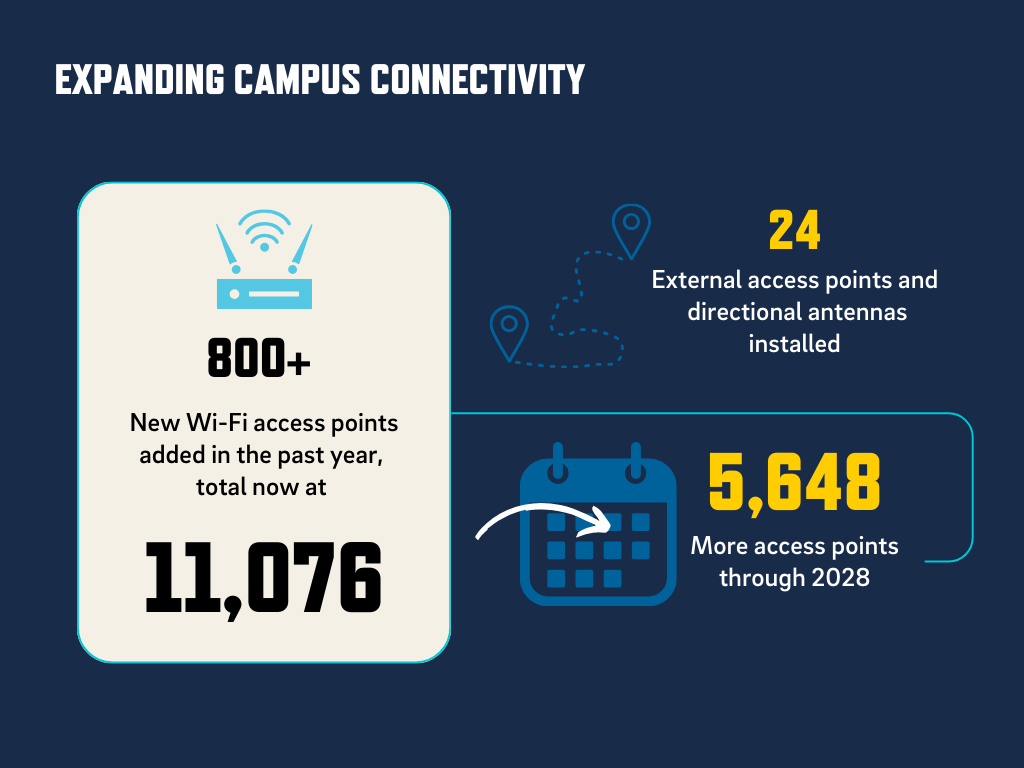
Goal 2: Renew Legacy Enterprise Systems
Delivering Smarter Systems
UC San Diego's Enterprise Systems Renewal (ESR) program addresses key goals identified in UC San Diego’s Strategic Plan, including creating an agile, sustainable and supportive infrastructure. This work is essential to ensuring that campus business systems and infrastructure can adequately support our mission as a leading research university.
Since inception, multiple projects have been started and released into production, covering data and analytics, financial management, personnel management, faculty and student information, space and facilities management, research administration, and more.
In 2023, work focused on advancing key efforts in the student information system, activity hubs and optimizing live systems.
Finance System Optimization
The Oracle Financials Cloud optimization efforts were championed this past year by the Office of Operational Strategic Initiatives (OSI), which conducted a current state review of finance systems and processes in order to make recommendations about optimization efforts and expedite Lean Six Sigma projects related to the Financial Information System (FIS). Key successes of this work featured end-user engagement to monitor and analyze financial processes and determine areas of opportunity. Long-term the FIS optimization work will transition to the Business & Financial Services (BFS) Processes & Systems Workgroup to continue to engage end users and ultimately sustain the optimization work. Additional optimization efforts over the last year include:
- Leveraging focus groups with faculty to identify report enhancements and priorities for report development to the Faculty and Researcher Dashboard
- Publishing progress updates periodically on main issues and resolutions (currently at 92% complete)
- Developing “hypercare” teams in VC Health Sciences and Academic Affairs to support departments with clean up efforts and PI support
- Developing Oracle training that focuses on sharing system and process best practices
- Hosting a two-day Fund Manager Summit to discuss on-going challenges and share best practices (400+ attendees)
Student Information System Project Brings Transformational Change
The Student Information System (SIS) Project is bringing transformational change to the university in the areas of course and class scheduling, enrollment and registration services, academic records, curriculum management, student finances and billing, and financial aid and scholarships. Over the past year, progress has been made toward key project objectives, as well as with other supporting work.
Core Student Information System
- As part of the request for proposal (RFP) for a new student information system to replace ISIS, conference room pilot sessions were held and a contract will soon be awarded to a winning vendor
- Began remediating reports used by the Colleges, met with stakeholders from across the university to better understand their reporting needs and current pain points, and continued refining the report inventory
- System design and configuration for Oracle Student Financial Planning are in progress for the Financial Aid Data Loader tool, the Fund Management tool, and College Financing Plan (CFP); development and testing of integrations with ApplyUC and Slate are also underway
- Began the design process for the new GEPA Financial Support & Payments Tool, which is set to launch in Spring 2024 for Summer 2024 use
- A system was selected, the implementation team and steering and advisory committees were formed; the first phase of the project is scheduled to go live in Winter 2024
- Launched the new TritonPay for general campus, updating the existing campus payment solution with Transact as backend system, providing a new, intuitive interface and expanded payment options to improve the student payment experience, and streamlining internal operations for staff
- Launched Transact for the Division of Extended Studies, replacing a number of existing payment processors and aligning the division with the general campus
- To prepare campus users for changes, the team conducted comprehensive change management, including hosting update presentations and listening sessions with many of the schools, divisions, and units that will be affected by the project and beginning discussions with campus leadership about the future state of training at UC San Diego.
Activity Hubs Transform Analysis and Reporting
Activity Hubs are central repositories for UC San Diego's enterprise systems data that allow users to more efficiently and effectively aggregate and analyze data from student, employee, facilities, financial and research systems.
The first Activity Hub, Student Activity Hub, went live for student data in 2019, followed by hubs for research, employee and financial data in 2020. A COVID Activity hub was created in 2021 to collect COVID reporting data to support UC’s COVID response efforts.
Activity Hub reporting and analysis features include:
- Single source for much historical and all new data
- Common definitions for single terms
- Simplified access request process
- Supported analytics tools: Cognos, Tableau
- Simplified views designed for easier data use
- Secure access and an audit trail ensure data is accessible only to those who require access to complete their work
- Easier analysis, reporting and visualization for all users
Accomplishments in 2023
Facilities Activity Hub
The Facilities Activity Hub (FacAH) went live in Fall 2023 with data from Tririga, the current facilities and space management system. Data in the Facilities Activity Hub focuses on space attributes, personnel assignments, and department allocation. Personnel assignments have been pre-joined with fields from the Employee Activity Hub (EAH) and Research Activity Hub (RAH). Space department information has been pre-joined with Chart of Account (CCOA) fields from the Financial Activity Hub (FINAH). Multiple departments have been waiting to blend facilities data with employee data, financial data, and research data to provide insights into who is using space at UC San Diego and how they are using that space.
Analytics currently being discussed include: vacancy and under-usage reports, department portfolios, AB-119 reports and a fall space report dashboard.
Compliance Activity Hub
The Compliance Activity Hub (CompAH) went live in Summer 2023 with data from Kuali Conflict of Interest. The Compliance Activity Hub will be a collection of restricted views focused on each compliance data set and available only to a small group of approved business users.
2023 Stats
- 2,529 new data fields added to Activity Hubs
- 18 new data views created
- AH report users has increased by 70%
- 610+ reports on Activity Hubs data are available for general use - with appropriate approvals - through various channels including the Business Analytics Hub
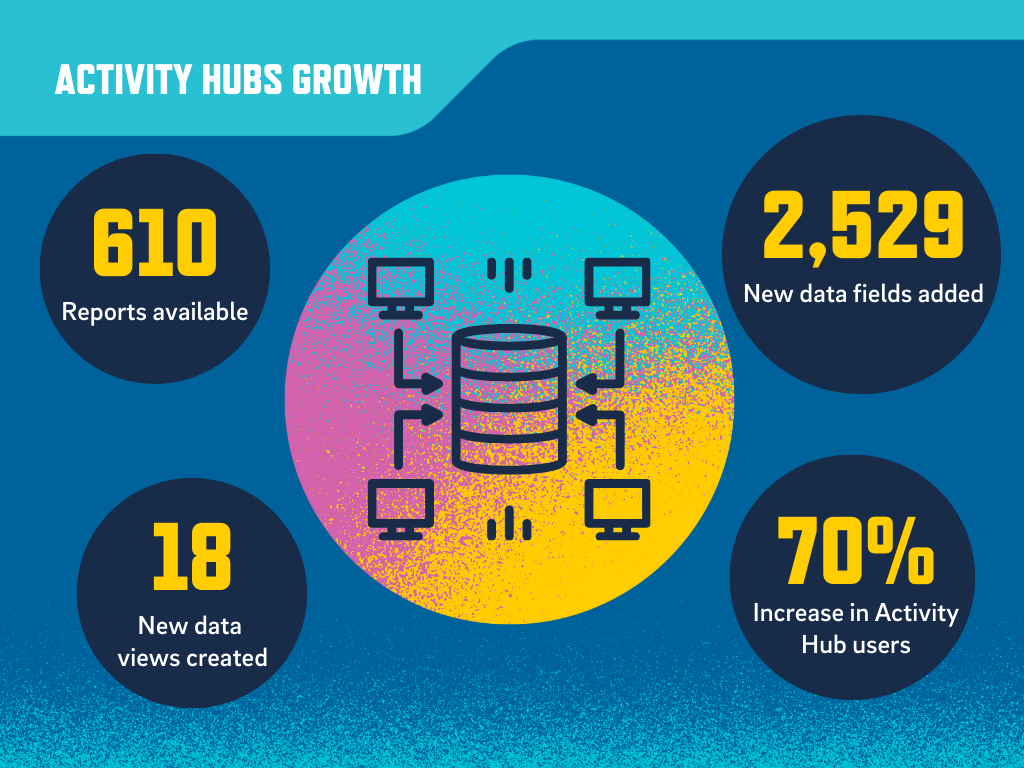
Faculty 180 Improves, Simplifies Academic Activity Collection
Faculty 180 is a digital solution for the collection and management of faculty activity in teaching, research and service. Faculty 180 provides academics the opportunity to enter activity as it happens, import activity from other UC San Diego systems, assist with the compilation and communication of their work, and generate activity reports (bibliographies) for personnel review actions. The tool may also be used to collect activity to support accreditation and other custom needs such as CV generation for grant submissions.
Phase 1 kicked off in Spring 2023 and included training for a pilot group consisting of 53 academics, five deans, 37 department staff, and four campus executives. Additionally, the project was presented at the New Faculty Orientation, resulting in 32 new faculty being onboarded and trained.
Additionally, the Phase 1 pilot revealed useful information and opportunities to easily implement improvements. The project team continues to engage with staff and academics through focus groups, surveys, office hours, training sessions and quarterly reminders for pilot participants to update their activities in Faculty 180.
During Phase 2, commencing Fall 2023, BioBibs generated from Faculty 180 will be included in academic files to be reviewed by campus committee and administrators. Further feedback will be collected and implemented and 2024-2025 pilot participants will be recruited.
Future enhancements include:
- Ability to connect with the California Digital Library to allow appointees to download claimed publications into their bibliographies
- Integrating Faculty 180 with Review, Promotion & Tenure
- Conversion to Interfolio’s new Vita Builder
- Parsing BioBibs for all Assistant Level Senate Faculty (approx 295 appointees) - completion expected by June 30, 2024
New Platforms Continue to Streamline Workflows
The ESR program includes several document and workflow services that increase productivity.
OnBase EDMSThe OnBase Electronic Document Management System (EDMS) securely stores campus documents that need to be retained for legal and regulatory purposes such as contracts and agreements, human resources records and policy documents. An EDMS improves workflows and optimizes processes related to data and document retention university-wide for campus business units, supporting workflows, document management, storage/retrieval, retention and data control.
OnBase achievements and stats include:
- 11 campus departments/processes currently using, three in transition (as of October 2023), and seven in the development queue
- 1,227 document types stored
- 6,416,203 documents stored
- 1,097 faculty and staff users
Kuali Build
Kuali Build is a cloud-hosted smart form and automated approval platform. It is designed to allow campus users to launch automated processes in a matter of minutes.
Kuali Build achievements and stats include:
- 419 total applications (end-to-end process including form, workflow and document repository)
- 66,808 total documents
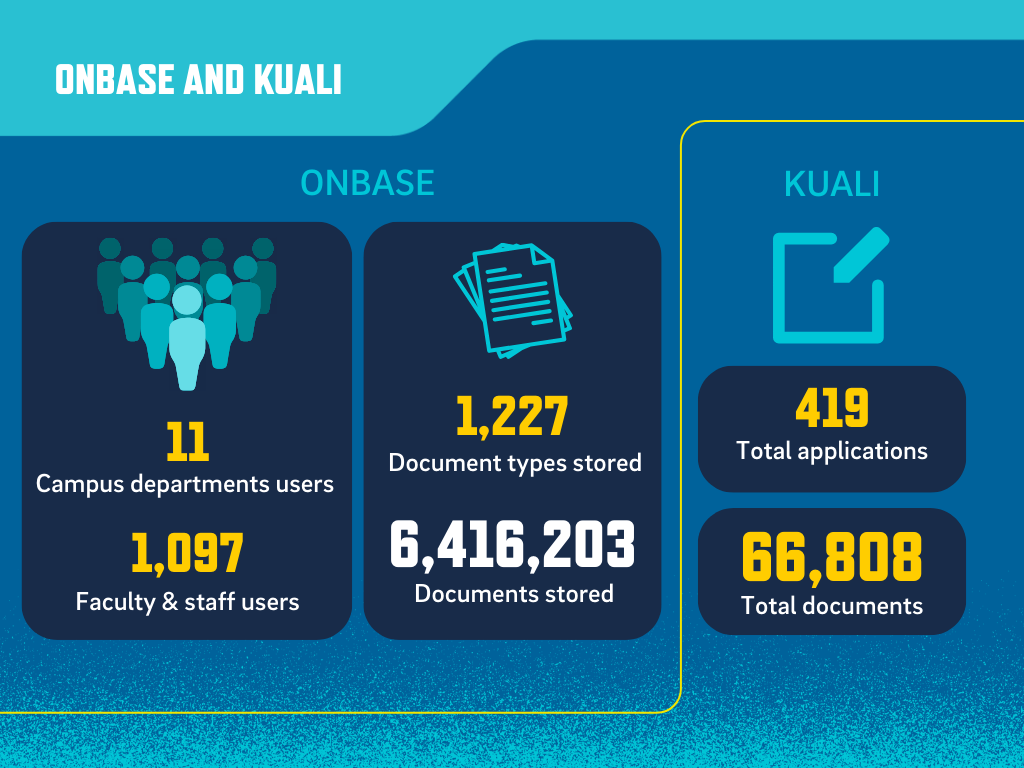
Goal 3: Continually Enhance Research Services
Building a Stronger Research Community
Research IT Services provides facilitation and integration support to faculty and other researchers at UC San Diego, including Health Sciences, professional schools, and divisions and departments. We have found areas of research need, focusing on gaps in research services and support, particularly those on the long tail of research with little to no support.
Universal Scale Storage (USS) Brokering Program
Research IT Services brokers SDSC’s Universal Scale Storage (USS) for researchers by providing 25 TB sub-allocations of the traditional 200 TB allocation to the San Diego Supercomputer Center’s large format Qumulo storage. With the partnership between Research IT and SDSC, researchers have access to reasonably priced storage with no additional charges from Research IT Services. Currently, we have 25 research groups utilizing 1500 TB of storage through this program.
“Since its inception in 2019, the SDSC Universal Scale Storage + Research ITS brokering program has made secure, large-scale, high-performance data storage available to research groups on campus that would not have been able to afford the node buy-in otherwise. Over 20 different groups spanning campus departments including Pediatrics, Chemistry/Biochemistry, Psychiatry, School of Public Health, and more have benefited from the program thanks to the advocacy of campus Research Facilitators. Over 1.5 PiB of storage has been provided through this program which continues to grow rapidly.”
- Brian Balderston, Director of Infrastructure, SDSC
Carpentries Program
Over the past three years, the Carpentries Program, which provides the fundamental computational researcher with coding skills, including R and Python, has expanded to offer an annual UC-wide workshop, which has been attended by 487 researchers as of 2023. This training is provided in addition to the local UC San Diego offerings and is taught by Carpentries-certified UC instructors for researchers systemwide. Beyond the thriving UC San Diego Carpentries Program, Research IT Services has also developed training available to researchers from all 10 campuses and the national labs.
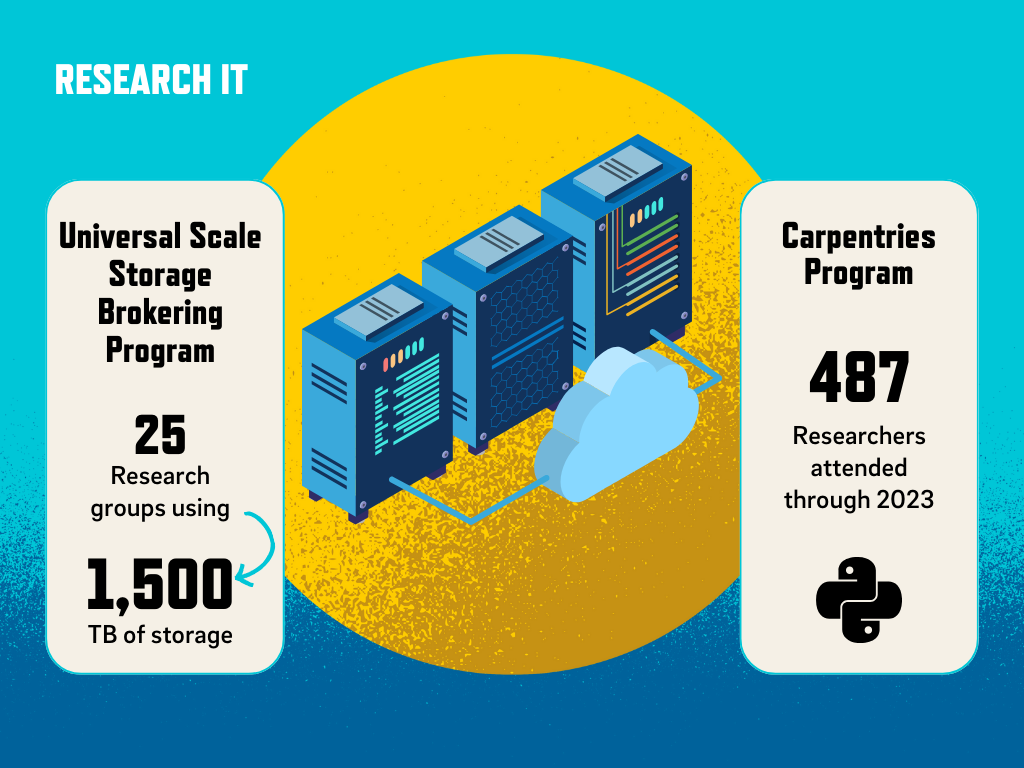
Co-located Research Computing and Data Support
The Department of Chemistry and Biochemistry, with support from the School of Physical Sciences, has partnered with Research IT Services to fund a full-time employee for dedicated support in the school. Applying their deep understanding of research and researcher needs, Research IT provides dedicated support throughout the entire research lifecycle to faculty, staff researchers, Postdocs, graduate and undergraduate students from pre-proposal, pre-award, through data collection and computation, into publication and curation, all the way through post-project archive. Research IT Services brings campus partners to the table to reduce time to research and to optimize solutions and efficiency for computationally and data intensive research in Chemistry and Biochemistry.
Facilitation Support for the Shipboard Technology Research Project
 In support of research at UC San Diego, the Research IT team works to decrease time to research by efficiently bringing together technologists who enable campus networking and other technology services. One such case was a project with Scripps Institution of Oceanography’s Shipboard Technology. In May 2022, Jon Meyer, Information Systems Manager at Shipboard Technical Support, SIO, requested a new commercial cloud (Azure) account. The objectives of this inquiry included leveraging Azure Stack to blend cloud and on-prem (shipboard) compute resources over a sometimes-slow internet link, assessing migration costs from SIO-Colo to Azure cloud, and creating shipboard replicas of Active Directory (AD) fed from campus records.
In support of research at UC San Diego, the Research IT team works to decrease time to research by efficiently bringing together technologists who enable campus networking and other technology services. One such case was a project with Scripps Institution of Oceanography’s Shipboard Technology. In May 2022, Jon Meyer, Information Systems Manager at Shipboard Technical Support, SIO, requested a new commercial cloud (Azure) account. The objectives of this inquiry included leveraging Azure Stack to blend cloud and on-prem (shipboard) compute resources over a sometimes-slow internet link, assessing migration costs from SIO-Colo to Azure cloud, and creating shipboard replicas of Active Directory (AD) fed from campus records.
After an initial meeting in June 2022 with the SIO Shipboard Project Team, regular bi-weekly meetings were established in August 2022. Key teams, including the AD Team, Cloud Operations Team, and Network Architects, were engaged. The deployment of a read-only domain controller (RODC) as a Proof of Concept (PoC) on the Research Vessel Roger Revelle was successful, exceeding expectations in remote areas. Thorough testing continued through January 2023.
By March 2023, the PoC transitioned to production, with RODCs operational on three research vessels (Roger Revelle, Sally Ride and Sproul). As a result of these tests, the SIO team expressed interest in expanding this technology to other ships within the US Academic Research fleet to aid collaborative efforts. In March 2023, SIO ShipCIS IT group received permanent funding, marking a significant milestone. Focus shifted back to Azure, migration, and storage of shared files. The team continued to meet bi-weekly, deploying Azure File Sync and resolving routing issues. As of April 2023, progress includes enabling solid DNS with Infoblox on each ship, deploying SpaceX's Starshield (the government version of Starlink) on R/V Sproul, and pursuing Azure credits for cloud implementation.
Goal 4: Focus on Cybersecurity
Agile Solutions for a Safe and Secure IT Environment
The Office of Information Assurance, Trust & Identity (OIA) is charged with ensuring the secure handling, availability, and confidentiality of all forms of information at UC San Diego. OIA’s goal is to go beyond the strict minimums of legal and policy compliance and to remain agile and vigilant in the face of a rapidly evolving campus environment.
Cybersecurity Operations Groups Standardizes Practices
The Cybersecurity Operations Group (CSOG) was established as a standing committee sponsored by the Chancellor charged with implementing elements of the campus cybersecurity program across academic, research and administrative units. CSOG focuses on implementing a modest set of discrete security practices that can be measured and that advance our cybersecurity posture.
CSOG created the “Active Hosts'' dataset to generate metrics tracking the installation status of endpoint security agents: Trellix HX (antivirus) and Qualys Cloud Agent (vulnerability management). Efforts to improve metrics have resulted in vastly improving our IP address management inventory (Infoblox) and installing more endpoint security agents.
Operational targets are to:
- Ensure the wide deployment of the two security programs, Trellix (formerly FireEye) HX and Qualys Cloud Agent
- Inventory administrative accounts and ensure they are protected by multi-factor authentication (MFA)
- Enable DUO MFA for critical servers not otherwise protected by MFA (requiring inventory of them)
- Reduce critical vulnerabilities in systems
Enhancements Improve Campus Security Posture
Over the past year OIA focused on continuing to enhance UC San Diego’s security operations and practices with several upgrades and implementations.
The DUO phone callback option was retired for 95,000+ faculty, staff, student and Health accounts in response to a known vulnerability and increased phishing attempts. As a result of this, UC San Diego went from an average of 130,000 phone callback authentications per month to under 400.
Implemented SonarCube, a code scanning tool that checks our software/code for vulnerabilities as well as common bugs. This covers items from SQL injection, cross site scripting, injection of code, and buffer overflows issues to name a few. SonarCube has greatly reduced our risk and is a process that is completed even before our security team gets involved, saving hundreds of hours from a security and remediation standpoint.
The Cybersecurity Maturity Model Certification (CMMC) program team completed the initial implementation of the enclave and started charging researchers under the new recharge model. UC San Diego was the first research institution to host a third-party “learning assessment,” during which seven third-party CMMC-certified assessors evaluated our implementation. Their findings may also influence needed rule changes for all research institution assessments.
Through September 2023, the Cybersecurity Certification for Research program has now certified $318+ million in research programs with 105+ certificates issued.
Via our “mock phishing” campaigns, which were expanded campuswide in January 2023, targeted users achieved an average 94%-95% success rate of not responding to malicious emails.
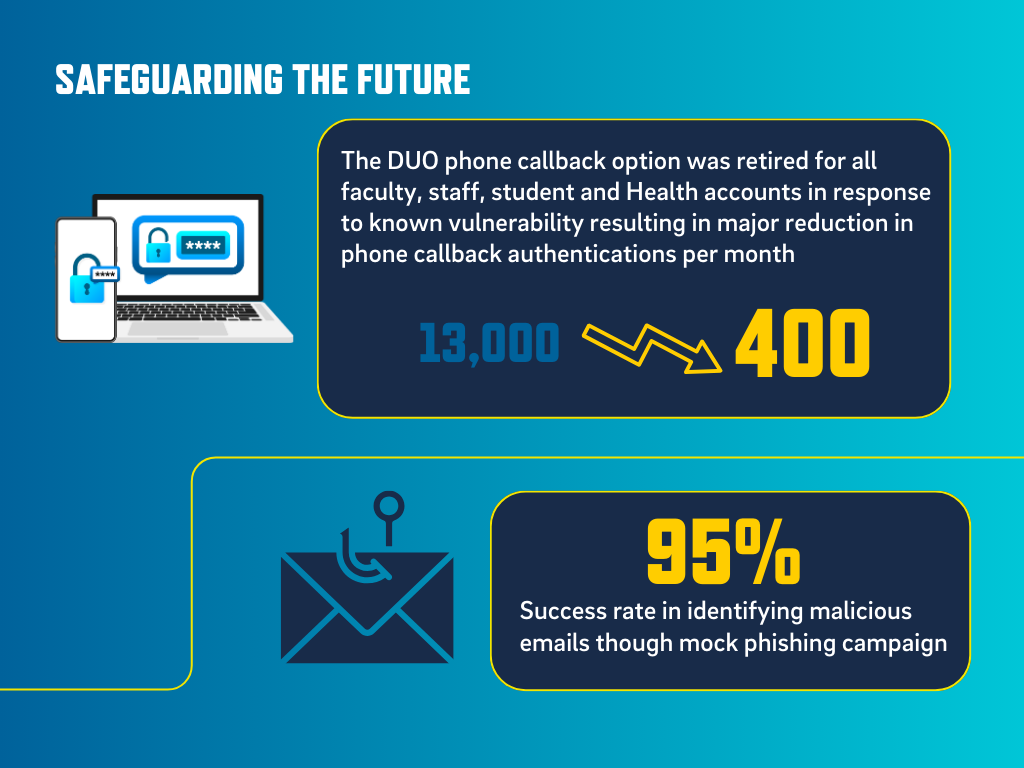
Goal 5: Improve Service Levels and Cost Efficiency
Consolidation + Automation = Maximization
From strategic partnerships with departments campuswide to leveraging cutting edge artificial intelligence and automation, IT Services excels in optimizing its service quality, streamlining its processes and maximizing its resources. Improvements are constantly being enacted to ensure customer satisfaction and operational efficiency.A Customer-Centric Approach to Service
IT Services prides itself on quickly responding to customer issues and outages. Key metrics are tracked, with results posted online each month. Additionally, for the past several years, IT Services has worked with other departments to consolidate case management into a common platform, known as the Services & Support Portal.
To date, 12 campus organizations and over 1,400+ agents use the portal.
For the past fiscal year, IT Services case management metrics include:
- 159 assignment groups
- 532 agents
- 91% tickets closed within 10 business days
- 137,459 tickets closed
- 82% service-level agreement success
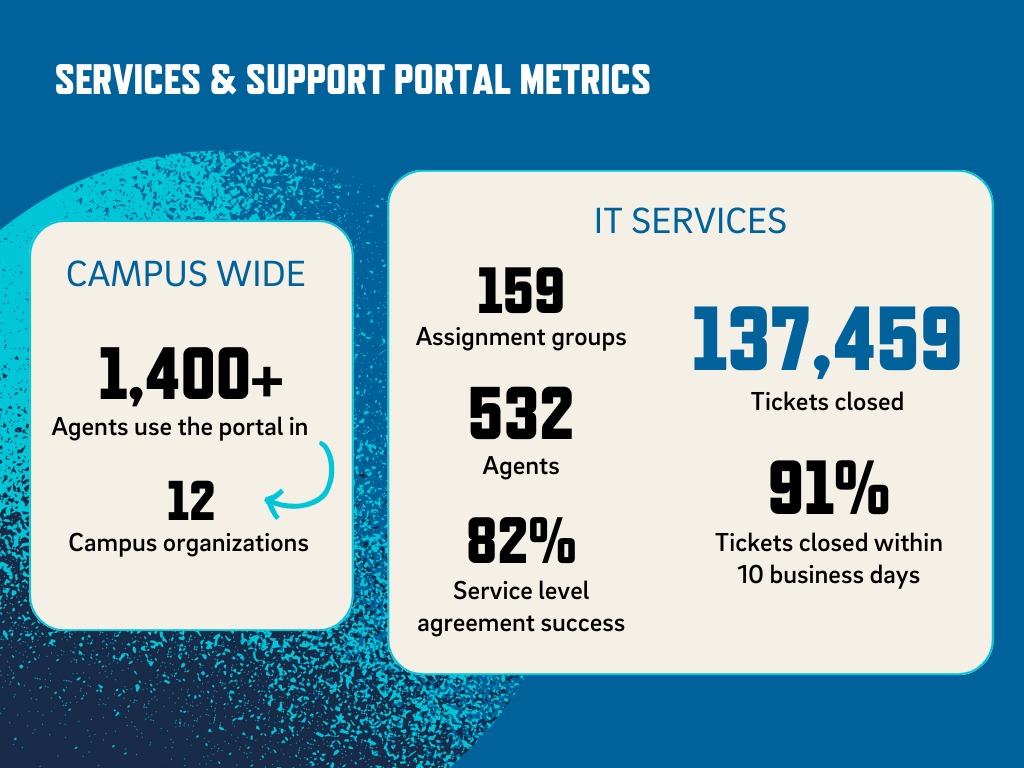
IT Asset Management Program (ITAM)
In 2022, we kicked off our IT Asset Management Program (ITAM) program by seeding our asset and configuration databases, streamlining and consolidating asset management processes, and automating data entry tasks to provide our organization with a transparent view into our desktop hardware estate. These efforts resulted in monumental changes, affecting how we request, procure, inventory, configure, deploy, monitor, support, and retire desktop hardware for 4,000+ users across campus who receive desktop support from IT Services.
ITAM achievements and stats include:
- 5,250 computers, 1,065 monitors, 1,236 docking stations & 75 printers in the system
- Time Savings:
- 562+ hours of time saved from automating manual database updates
- 261+ hours of time saved from streamlining/automating the requisition and procurement process for hardware
- 83.3% reduction in average time to fulfillment for computer hardware requests
- Partnership with the UC San Diego Bookstore:
- Nearly all of our hardware is now sourced through the Bookstore. The Bookstore has agreed to hold inventory for us, but will not charge us until we request an asset.
- Order Computer Equipment Form has replaced the manual requisition process with a form which automates the data collection and data entry process, distributes approval tasks, and finally sends it all to the Bookstore for fulfillment.
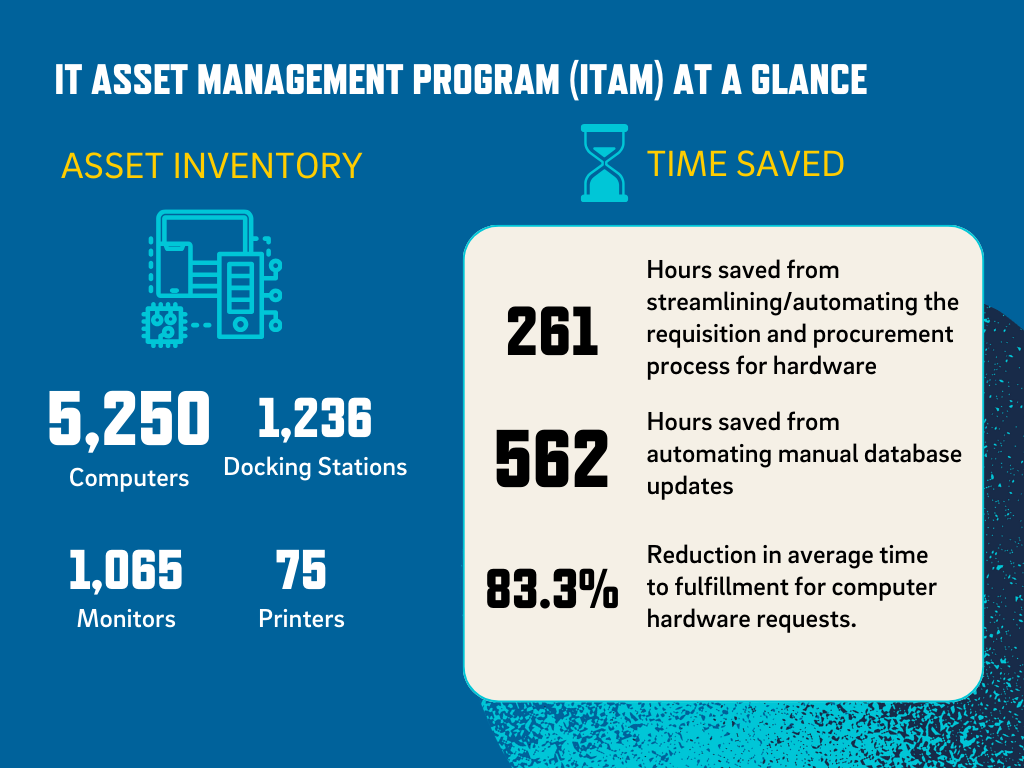
AI in Action
Artificial Intelligence (AI) has evolved from being a niche scientific concept to an instrumental technology that has the power to transform various sectors, including education and administration. IT Services at UC San Diego is implementing AI technologies to help streamline administrative functions. Leveraging a multi-disciplinary approach, we are launching a diverse set of AI services that span from virtual assistant and chatbot assistance for service desks to advanced generative AI models built on cutting-edge open-source language frameworks. This strategic integration ensures that the advantages of AI permeate various administrative departments, thereby fostering a more streamlined, efficient, and responsive administrative environment.
In 2023 alone, we have introduced AI tools such as:
- Sunny, the brand-new Service Desk Virtual Agent
- Sunny combines predefined "topics" with Natural Language Understanding (NLU) to empower users to resolve common issues independently. Sunny seamlessly integrates data from our ServiceNow platform and Knowledge Base, ensuring the user receives the most up-to-date and accurate information. Whether you're dealing with account management, Duo token orders, Zoom licensing, or hardware issues, Sunny has you covered.
- AI Guidance for Staff on Blink
- With technology advancements such as ChatGPT, Google Bard, and other AI-driven platforms, there's growing enthusiasm within our UC San Diego community to leverage these tools and integrate them into our ecosystem. This guide serves to advise UC San Diego staff on safe and compliant use of Generative AI tools, ensuring we do not compromise institutional, personal, or proprietary data.
Cloud Platforms Accelerate Efficiencies
A number of cloud-based platforms that have been released in recent years empower personnel like never before to solve problems, complete workflows, and derive solutions.
Highlights include:
- Docusign: Average 405 “envelopes” sent per day, 147,916 envelopes sent last year, 81% envelope completion rate
- Qualtrics: 39,939 surveys conducted since inception, 2.8M responses last year, 6,457 active users
- Lucidchart: 17,077 total users, 62,718 documents created, 383,081 document views
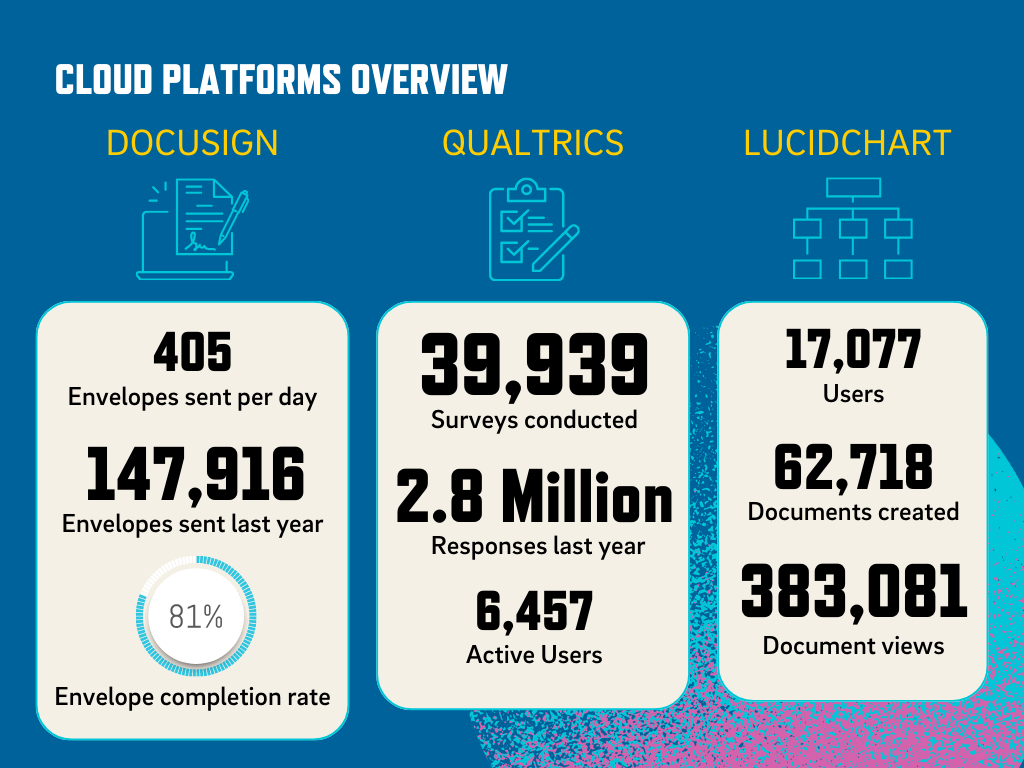
Empowering Change: Driving Continuous Improvement
At IT Services, the spirit of continuous improvement inspires everything we do. From the formal to the informal, we strive to always challenge ourselves and make a difference from the incremental to the incredible. We incorporate continuous improvement through small, everyday wins and formal mechanisms like After Action Reviews, Incident Reviews, and Process Improvement Reviews, as well as Lean Six Sigma projects.
As part of our commitment to continuous improvement, each service owner within IT Services is responsible for conducting a minimum of six process reviews every year. To ensure that our dedication to process reviews remains transparent and measurable, in March 2023 we introduced a user-friendly Continuous Improvement Dashboard within ServiceNow (SNOW). These dashboards are accessible to everyone, providing real-time insights into the progress of our process reviews. This transparency not only holds us accountable but also enables us to track our performance collectively.
From March - October 2023, there have been 185 Process Reviews resulting in the following outcomes:
- $63,550 saved
- 1,624 hours redeployed
Leaning Out and Leveling Up
IT Services leverages the Lean Six Sigma (LSS) methodology to make continuous improvement a core foundation of work. New hires complete an LSS Yellow Belt (beginner) certification within a few months of starting, while all managers and service owners are required to pursue more advanced training via Green and Black Belts. Additionally, the department sponsors scholarships for other staff managers who qualify.
Lean Six Sigma training statistics through 2023:
- 594 Yellow Belts
- 67 Green Belts; 38 projects completed
- 13 Black Belts; 10 projects completed
Since 2016, formal Lean Six Sigma projects have resulted in the following outcomes:
- $6.28 million total savings
- 6 staff reallocations
- 109k+ hours saved
- $50,000+ increased revenue/cost avoidance
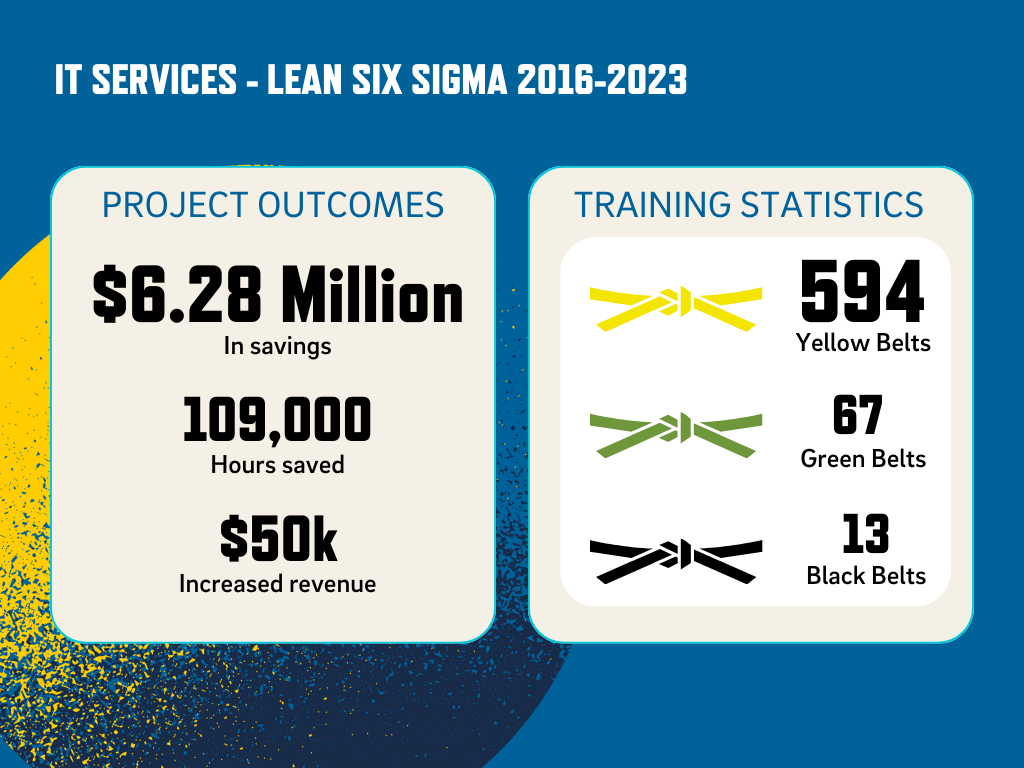
IT Services’ commitment to continuous improvement underscores a larger campuswide movement, all in support of UC San Diego’s Strategic Plan Goal 5: Supportive Infrastructure. Goal 5 is summarized as, “Creating an agile, sustainable, and supportive infrastructure by ensuring a dedication to service, people and financial stewardship.” The full text of Goal 5 uses the word “efficient” (or a derivation) 13 times.
More information about UC San Diego’s campus wide efforts and culture are detailed on the continuous improvement website.
Finally, everything comes together at the annual Process Palooza conference, co-sponsored by IT Services. Hosted by UC San Diego, Process Palooza is a high-energy collaborative experience showcasing and celebrating the power of continuous improvement. On March 28 - 29, 2023 attendees experienced professional exchanges, sessions, workshops, games, competitions and Community Pavilion exhibits offered to inspire individuals and organizations to share, learn, begin or advance their continuous improvement journey.
Here are some notable highlights and outcomes from Process Palooza 2023:
- 680+ attendees from 75 distinct organizations
- 21 breakout sessions, 15 poster sessions, three plenaries, two pre-event add-on professional trainings (costing an additional $150-$300, which sold out), and one keynote
- 36 competitors, comprising 6 teams, took part in The Great Innovate Competition, putting their LSS skills to the test on two real UC San Diego business processes
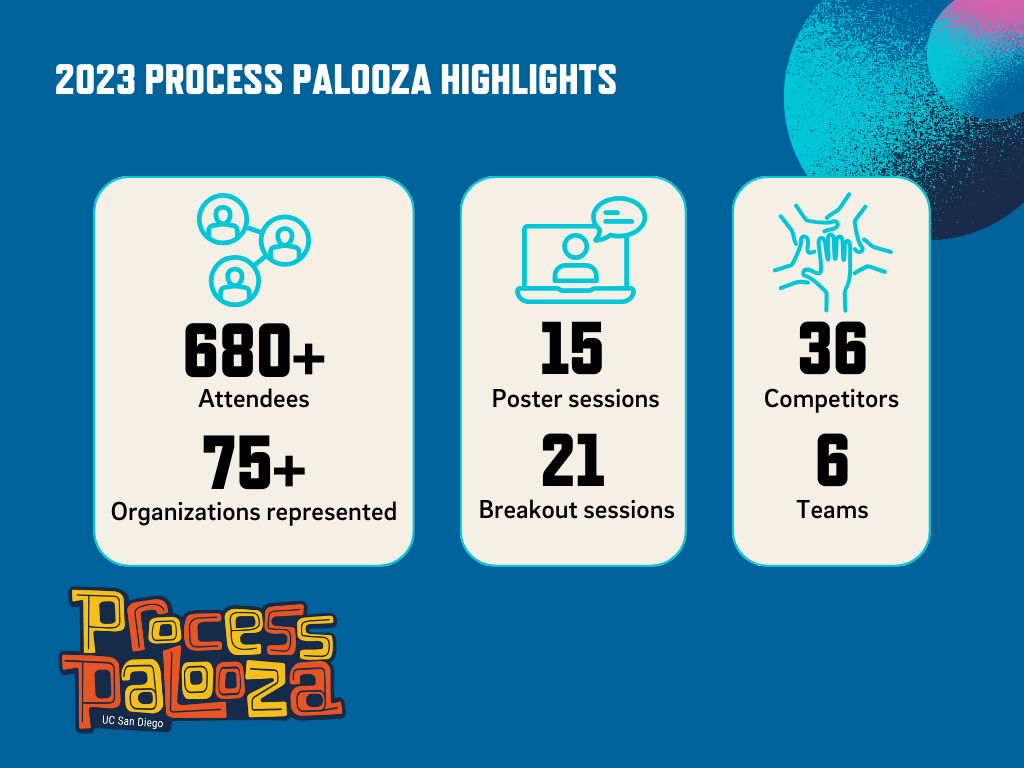
Goal 6: Invest in Inclusive Excellence
We're Better Together
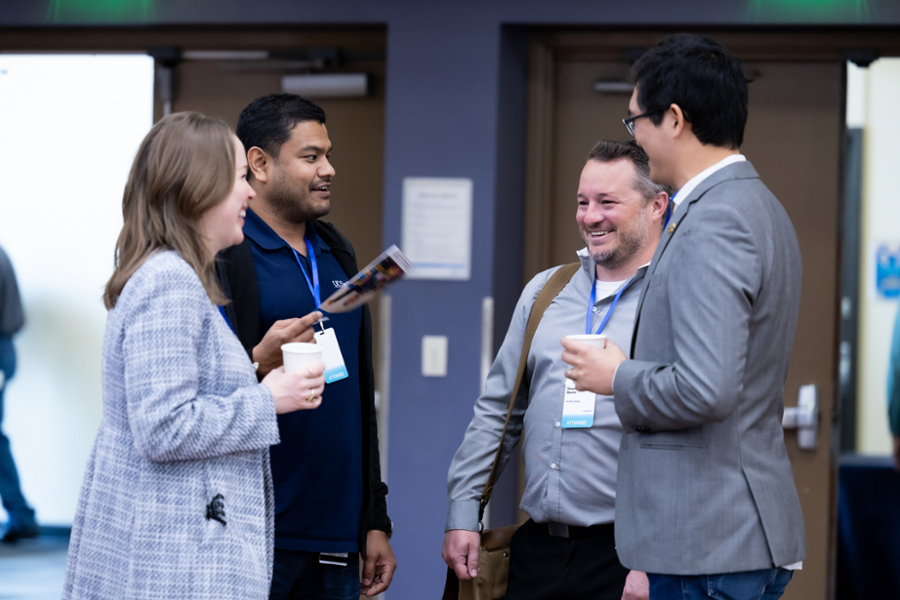 At IT Services, we believe that the true height of our potential can only be realized when our voices are given the space to be heard and resonate. This is why we champion diversity, equality and inclusivity in our staff - because we’re better together. Our efforts are wide-ranging, covering everything from ensuring a diverse workforce, providing staff training, presenting internally and externally, serving on committees and acknowledging inclusive excellence through awards and scholarships.
At IT Services, we believe that the true height of our potential can only be realized when our voices are given the space to be heard and resonate. This is why we champion diversity, equality and inclusivity in our staff - because we’re better together. Our efforts are wide-ranging, covering everything from ensuring a diverse workforce, providing staff training, presenting internally and externally, serving on committees and acknowledging inclusive excellence through awards and scholarships.
Recruitment and Retention
- All members of hiring panels required to complete online implicit bias training
- “Insourcing” model was instituted to provide promotional opportunities for short-term needs, providing staff members with on-the-job training and experience and the opportunity to complete “stretch” assignments
Training and Education
- Introduced requirement for all managers to complete six-module “Managing Implicit Bias” online course; as of October 2023, 70 certifications received
- Inclusive Excellence Forum, started in January 2022, continues with monthly sessions that use readings and other materials to facilitate discussions on issues of race and other types of discrimination
- Offered “A Workshop for Better Allies” sessions to IT Services staff: 2.5-hour workshops designed to raise awareness of the challenges coworkers from underrepresented groups can face, along with everyday actions to take to be better allies and create a more inclusive workplace culture.
- The book Better Allies: Everyday Actions to Create Inclusive, Engaging Workplaces by Karen Catlin made available to all IT Services staff
- 5 workshops attended by 215+ IT Services employees
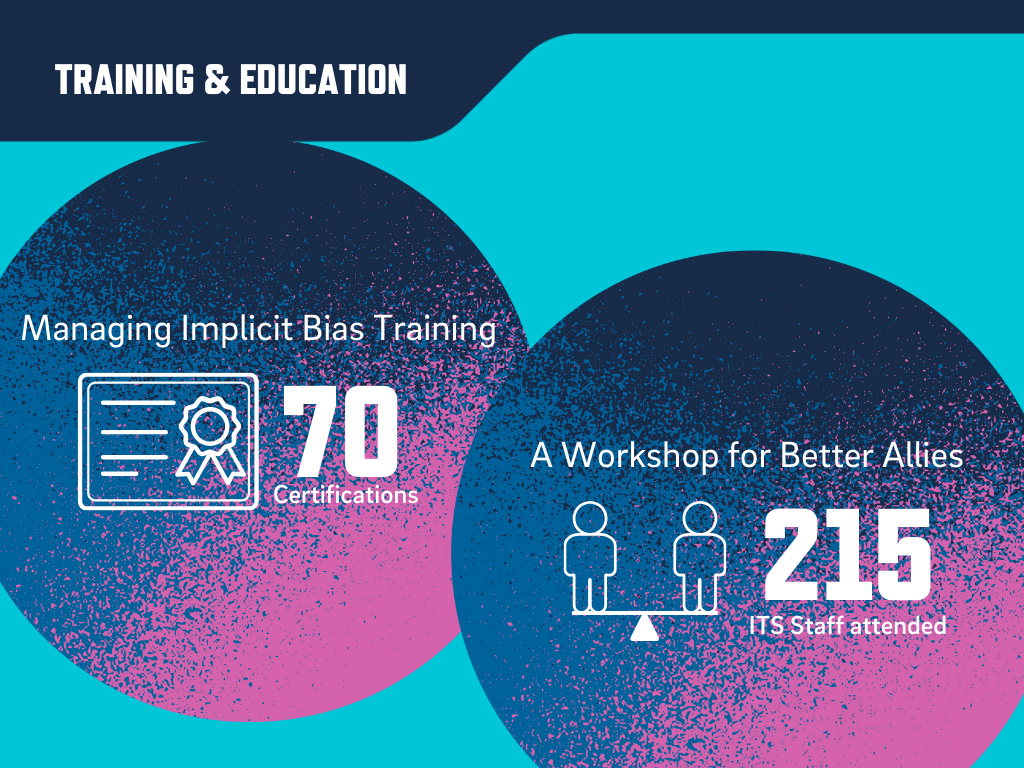
Presentations
- LEAD Fellows Brian DeMeulle and Declan Fleming conducted two, hour-long discussion sessions on DEI training materials for the Student Health department. Brian and Declan also consulted with the Business and Finance Travel Department to provide DEI input on proposed sessions, topics and content to be presented at the annual SCTEM conference.
Committees
- Sheryl Gerbracht, Sophia Nasrallah, Brian DeMeulle, and Declan Fleming serve on the VC-CFO Inclusive Excellence committee
- Carolyn Ellis served in a leadership role with UC San Diego’s re-booted Women in Tech group
- Brian DeMeulle serves on the EDUCAUSE DEI Advisory Committee. The committee’s major functions are to advise EDUCAUSE leadership on DEI matters in association to strategy and programming, and to serve as the voice of the EDUCAUSE membership on DEI matters.
- Veronica Garcia is one of three UC San Diego representatives on the University of California Women in Technology Committee
Awards and Scholarships
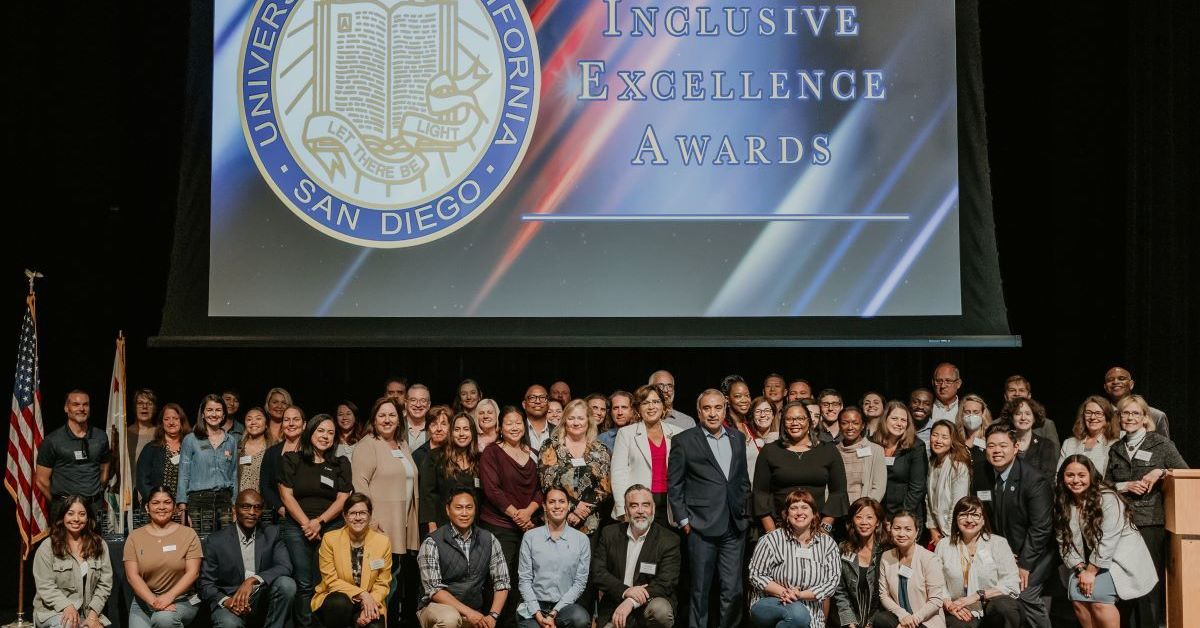
- Sheryl Gerbracht named 2022 UC San Diego Inclusive Excellence Award recipient for the Chief Financial Officer area
- Brian DeMeulle completed the Social Justice Training Institute program in June 2023 as well as earning a DEI Certificate through Cornell University in September 2023
- Continued departmental Inclusive Excellence Award and named Carolyn Ellis as the 2022 recipient
- IT Services Network Management System Administrator Anna Liza Smith was one of seven women to receive the 2023 Community Exchange Internet2 Inclusivity Scholarship, which recognizes and encourages the meaningful participation of women information technology professionals in the research and education community
- Awarded the inaugural IT Services STEM Student Scholarship of $10,000 to Nikitha Kalahasti, a Sophomore and Provost Honors Student, majoring in Bioengineering. This scholarship honors an undergraduate student with a STEM-focused field of study who has also demonstrated a proven commitment to the advancement of women in STEM.
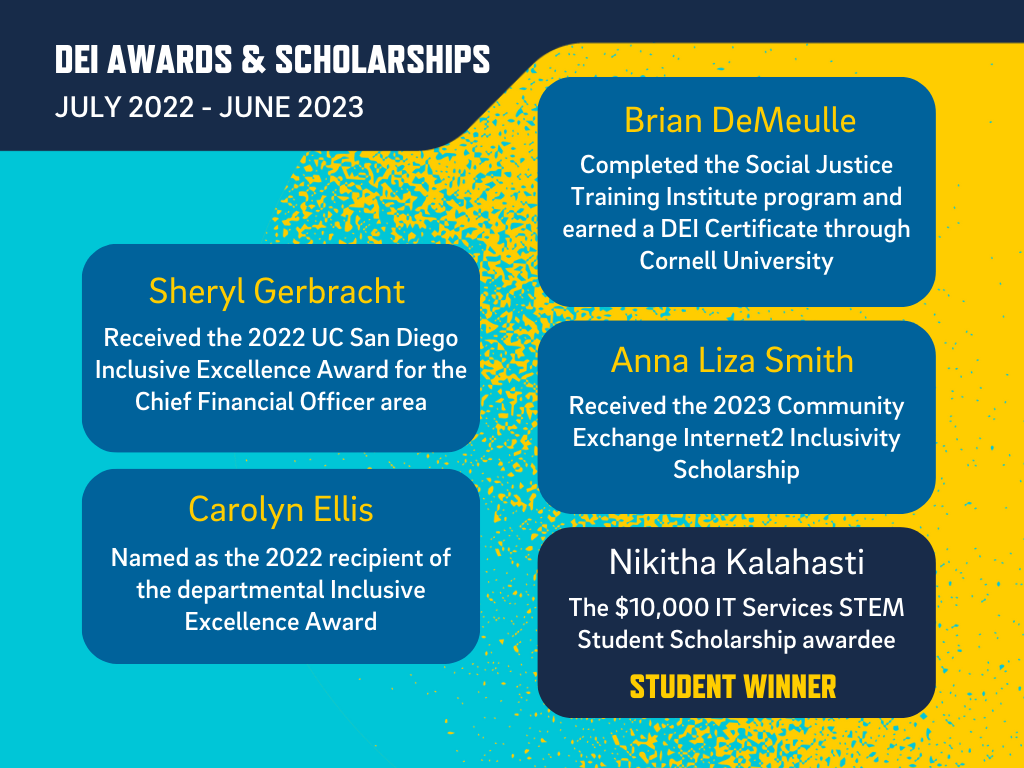
Department Accomplishments and Recognition
A People-Driven Commitment to Excellence
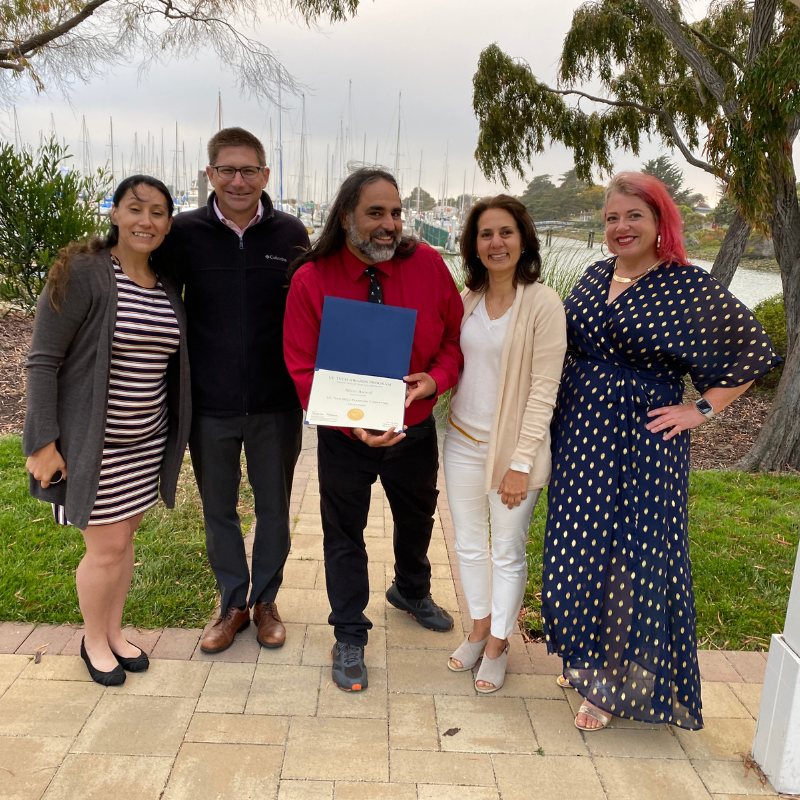 IT Services thrives on the strength of our resilient, diverse, and highly creative workforce. While the majority of our team is rooted in San Diego, we also embrace remote work, offering both flexibility and access to top-tier talent across the country.
IT Services thrives on the strength of our resilient, diverse, and highly creative workforce. While the majority of our team is rooted in San Diego, we also embrace remote work, offering both flexibility and access to top-tier talent across the country.
The following highlights are just a glimpse of the remarkable accomplishments achieved by this exceptional group during 2022-2023:
- UC Tech Silver UC Collaboration Award for the 2022 UC Tech Planning Committee
- 34 episodes of The Current Podcast produced in FY22/23, with 4,065 plays; since inception in March 2020 through July 2023, the podcast has achieved 20,000+ listens
- Continuation of Leadership Learning Program Cohort 6, with 12 employees meeting monthly to discuss books and articles, network, complete exercises, and grow as leaders. To date, 63 employees have participated in Cohorts 1-6.
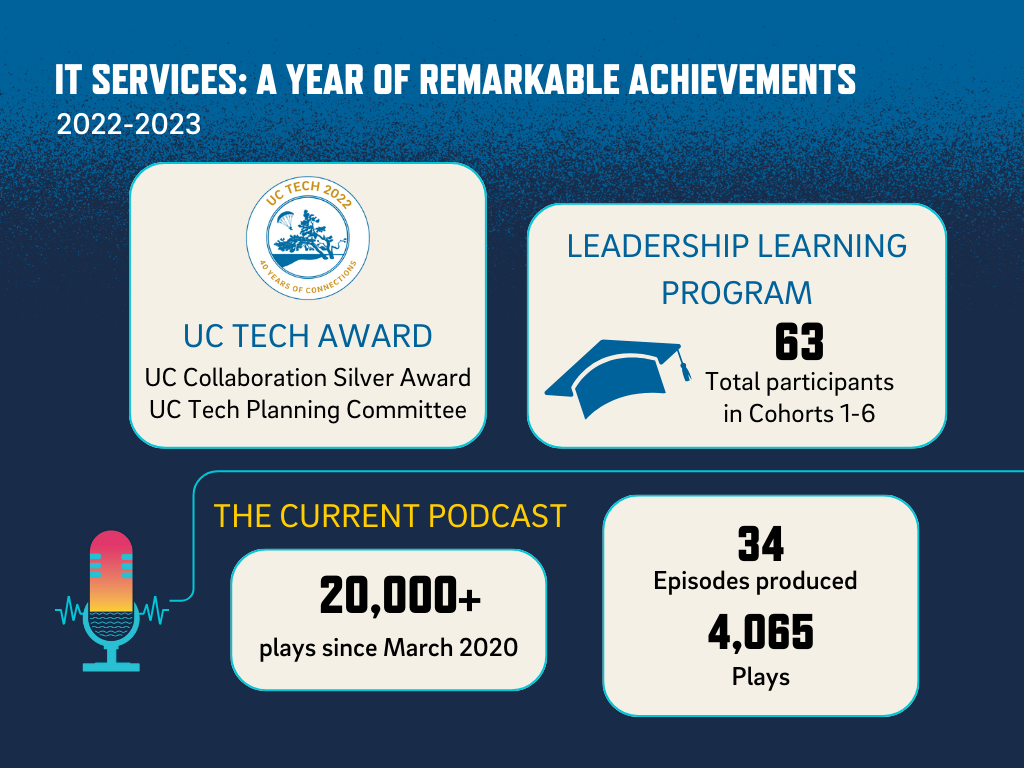
- 18 conference presentations during AY22/23
- Think Like an Entrepreneur Award presented to senior applications programmer Matthew Barrett for his efforts building a custom NiFi linter, or static code analyzer, to detect programming errors, bugs, and suspicious constructs, saving hundreds of hours of developer time in writing code and in code reviews
- Vibrant Toastmasters club with members meeting twice a month to hone presentation skills
- 21 department-led communities of practice, roundtables, and office hours
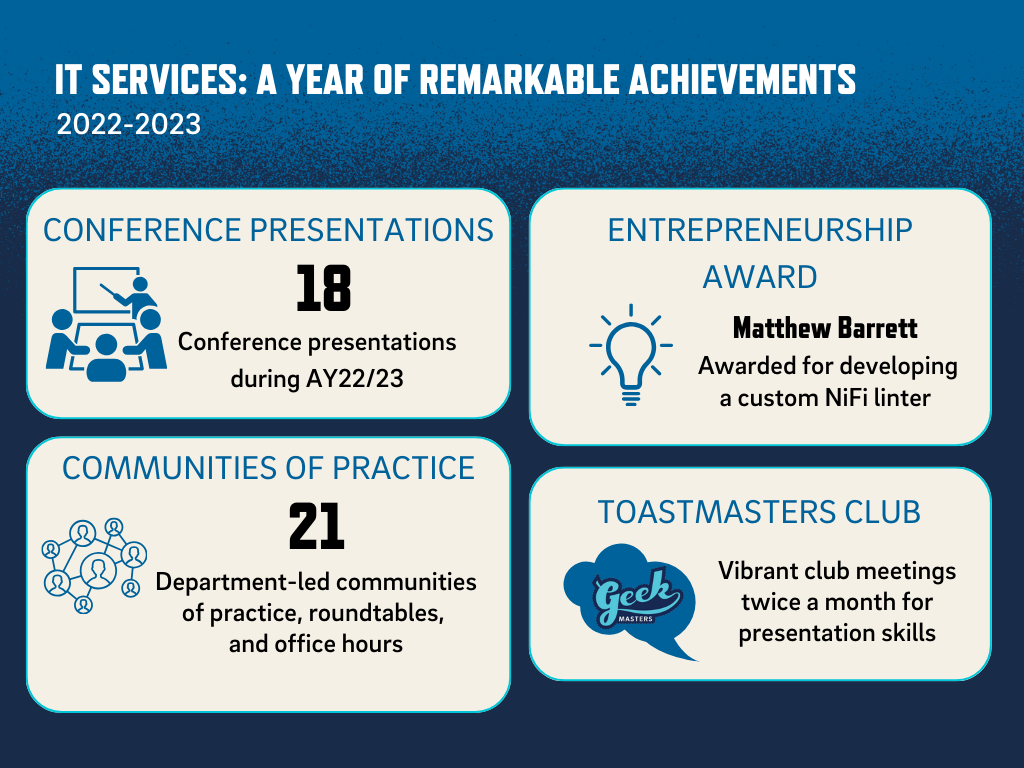
UC San Diego Technical Community
Tech Community
UC San Diego is home to a thriving technical community of some 1,500+ professionals in IT Services, Health Information Services, and several schools and divisions.
In 2023, IT Services continued its efforts to engage with the tech community by:
- Conducting Campus LISA 2023 with three virtual presentations with 260+ logins and an average of 90 attendees per session; hosted a community lunch event with 100+ attendees
- Conducting eight virtual TechTalks, with 750+ total logins and an average attendance of 75 people per session; hosting one on-campus tech community meetup
